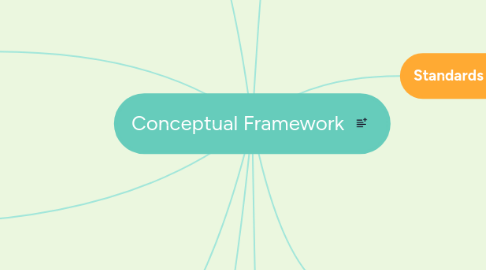
1. Knowledge Strands
1.1. Four Strands
1.1.1. Conceptual
1.1.1.1. Knowledge of concepts and ideas of subject area being taught
1.1.2. Strategic
1.1.2.1. Intentional actions to achieve goals for lessons, procedures, and instruction
1.1.3. Evaluative
1.1.3.1. Develop and implement assessments
1.1.4. Communicative
1.1.4.1. Communication is important
2. History
2.1. Developed in 1996
2.1.1. Hopes for candidates to make informed decisions, structure for the novice, and a foundation for entire length of career growth.
2.1.2. Reflective Constructors of Quality Learning Experiences
3. Mission
3.1. Prepare for the future
3.2. Profession Preparation
4. Philosophy and Purpose
4.1. Prepare students for a life of success
4.2. Responsibility to ensure the welfare and enrichment of society
5. Theme
5.1. Strives to have educators who are prepared and have a good knowledge, philosophy, and understanding of the education profession.
5.1.1. Positive direct impact on student learning
6. Knowledge Bases
6.1. Reflective
6.1.1. Good teachers are always growing and in the process of deep reflection
6.1.2. Good way to see how a candidates personal understanding impacts curriculum
6.2. Constructivism
6.2.1. develops knowledge based on personal experiences, beliefs, and pre-existing mental structures.
6.2.2. develop their own understanding rather than having it laid out for them
6.2.2.1. Learners learn best by working in a collaborative environment and with more knowledgeable individuals
6.3. Quality Learning Experiences
6.3.1. reflect on the continuous application of constructivism
6.3.2. incorporate diversity, encourage candidates to have a global awareness of diverse student populations
6.4. Critical Thinking
7. Goal
7.1. Provide quality learning experiences to graduates
7.1.1. encourage graduates to be proficent in ethical deliberation.
8. Assessment Systems
8.1. Assessment Pillars
8.1.1. Admission
8.1.2. Continuous
8.1.2.1. Checkpoints
8.1.3. Graduation
8.2. Key Assessments
8.2.1. Clinical/Field Experience
8.2.2. Entrance Exam
8.2.2.1. Praxis Core
8.2.2.2. GRE
8.2.3. GPA
8.2.3.1. 2.75 - 3.0
8.2.4. Code of Ethics
8.2.5. Praxis II
8.2.5.1. Principals of Learning
8.2.5.2. Content Knowledge
8.2.6. Recommendations
9. Standards & Dispositions
9.1. Key Dispositions
9.1.1. Caring
9.1.2. Strong work ethic
9.1.3. Critical and Creative thinking
9.1.3.1. Vital to teaching and learning
9.1.4. Commitment to excellence
9.1.5. Professional Integrity
9.2. Promote growth and preservation of society
9.2.1. The most effective teachers have attitudes and beliefs that distinguish them from others.

